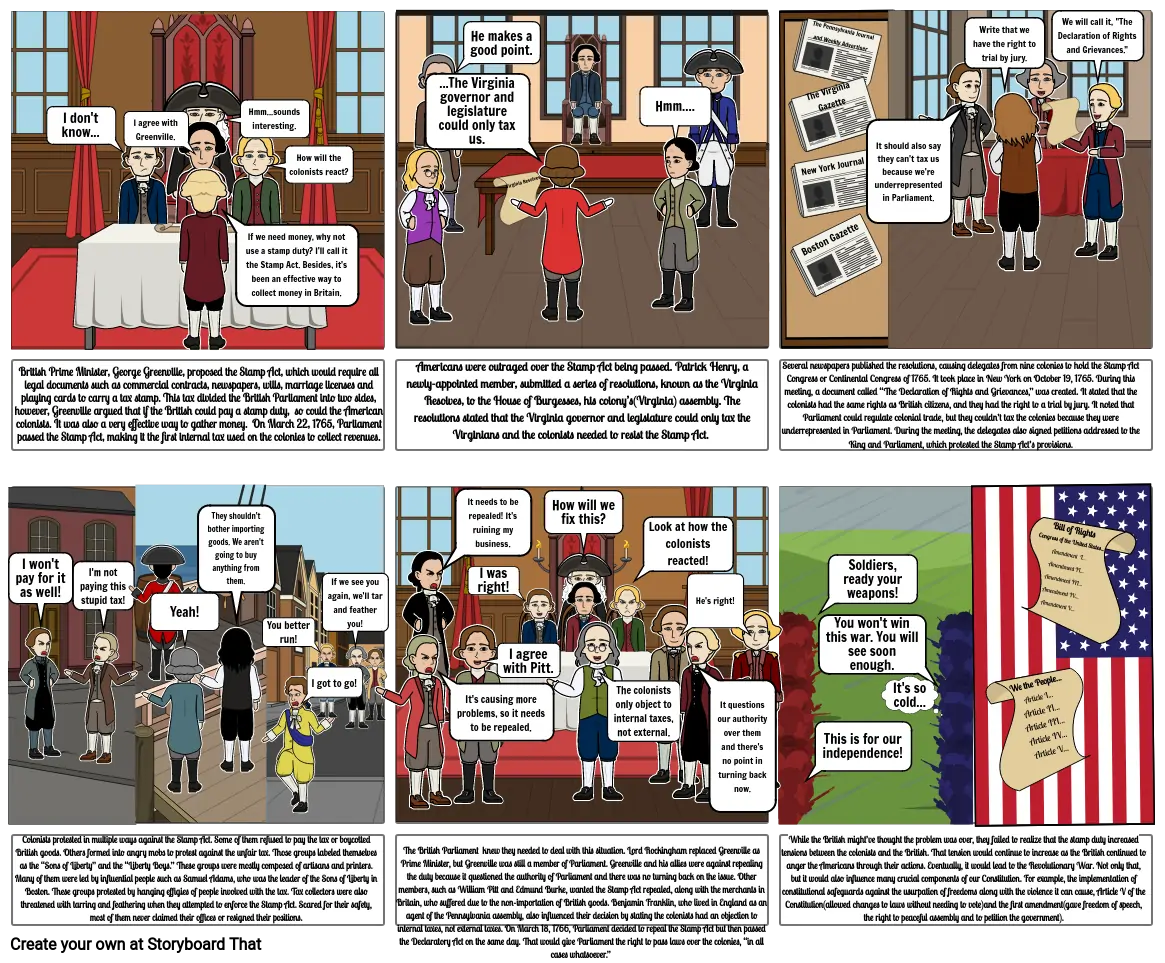The Stamp Act of 1765

Storyboard Text
- I don't know...
- I agree with Greenville.
- If we need money, why not use a stamp duty? I'll call it the Stamp Act. Besides, it's been an effective way to collect money in Britain.
- Hmm...sounds interesting.
- How will the colonists react?
- ...The Virginia governor and legislature could only tax us.
- He makes a good point.
- Virginia Resolves
- Hmm....
- Several newspapers published the resolutions, causing delegates from nine colonies to hold the Stamp Act Congress or Continental Congress of 1765. It took place in New York on October 19, 1765. During this meeting, a document called “The Declaration of Rights and Grievances,” was created. It stated that the colonists had the same rights as British citizens, and they had the right to a trial by jury. It noted that Parliament could regulate colonial trade, but they couldn’t tax the colonies because they were underrepresented in Parliament. During the meeting, the delegates also signed petitions addressed to the King and Parliament, which protested the Stamp Act’s provisions.
- The Virginia Gazette
- New York Journal
- The Pennsylvania Journal and Weekly Advertiser
- Boston Gazette
- It should also say they can't tax us because we're underrepresented in Parliament.
- Write that we have the right to trial by jury.
- We will call it, "The Declaration of Rights and Grievances."
- I won't pay for it as well!
- British Prime Minister, George Greenville, proposed the Stamp Act, which would require all legal documents such as commercial contracts, newspapers, wills, marriage licenses and playing cards to carry a tax stamp. This tax divided the British Parliament into two sides, however, Greenville argued that if the British could pay a stamp duty, so could the American colonists. It was also a very effective way to gather money. On March 22, 1765, Parliament passed the Stamp Act, making it the first internal tax used on the colonies to collect revenues.
- hi
- I'm not paying this stupid tax!
- Yeah!
- They shouldn't bother importing goods. We aren't going to buy anything from them.
- You better run!
- I got to go!
- If we see you again, we'll tar and feather you!
- Americans were outraged over the Stamp Act being passed. Patrick Henry, a newly-appointed member, submitted a series of resolutions, known as the Virginia Resolves, to the House of Burgesses, his colony’s(Virginia) assembly. The resolutions stated that the Virginia governor and legislature could only tax the Virginians and the colonists needed to resist the Stamp Act.
- It's causing more problems, so it needs to be repealed.
- It needs to be repealed! It's ruining my business.
- I was right!
- I agree with Pitt.
- How will we fix this?
- The colonists only object to internal taxes, not external.
- Look at how the colonists reacted!
- He's right!
- It questions our authority over them and there's no point in turning back now.
- hi
- Soldiers, ready your weapons!
- You won't win this war. You will see soon enough.
- It's so cold...
- We the People...Article I...Article II...Article III...Article IV...Article V...
- Bill of RightsCongress of the United States...Amendment I...Amendment II...Amendment III...Amendment IV...Amendment V...
- h
- Colonists protested in multiple ways against the Stamp Act. Some of them refused to pay the tax or boycotted British goods. Others formed into angry mobs to protest against the unfair tax. Those groups labeled themselves as the “Sons of Liberty” and the “Liberty Boys.” These groups were mostly composed of artisans and printers. Many of them were led by influential people such as Samuel Adams, who was the leader of the Sons of Liberty in Boston. These groups protested by hanging effigies of people involved with the tax. Tax collectors were also threatened with tarring and feathering when they attempted to enforce the Stamp Act. Scared for their safety, most of them never claimed their offices or resigned their positions.
- The British Parliament knew they needed to deal with this situation. Lord Rockingham replaced Greenville as Prime Minister, but Greenville was still a member of Parliament. Greenville and his allies were against repealing the duty because it questioned the authority of Parliament and there was no turning back on the issue. Other members, such as William Pitt and Edmund Burke, wanted the Stamp Act repealed, along with the merchants in Britain, who suffered due to the non-importation of British goods. Benjamin Franklin, who lived in England as an agent of the Pennsylvania assembly, also influenced their decision by stating the colonists had an objection to internal taxes, not external taxes. On March 18, 1766, Parliament decided to repeal the Stamp Act but then passed the Declaratory Act on the same day. That would give Parliament the right to pass laws over the colonies, “in all cases whatsoever.”
- dfad
- jk
- While the British might’ve thought the problem was over, they failed to realize that the stamp duty increased tensions between the colonists and the British. That tension would continue to increase as the British continued to anger the Americans through their actions. Eventually, it would lead to the Revolutionary War. Not only that, but it would also influence many crucial components of our Constitution. For example, the implementation of constitutional safeguards against the usurpation of freedoms along with the violence it can cause, Article V of the Constitution(allowed changes to laws without needing to vote)and the first amendment(gave freedom of speech, the right to peaceful assembly and to petition the government).
- This is for our independence!
Over 30 Million Storyboards Created

